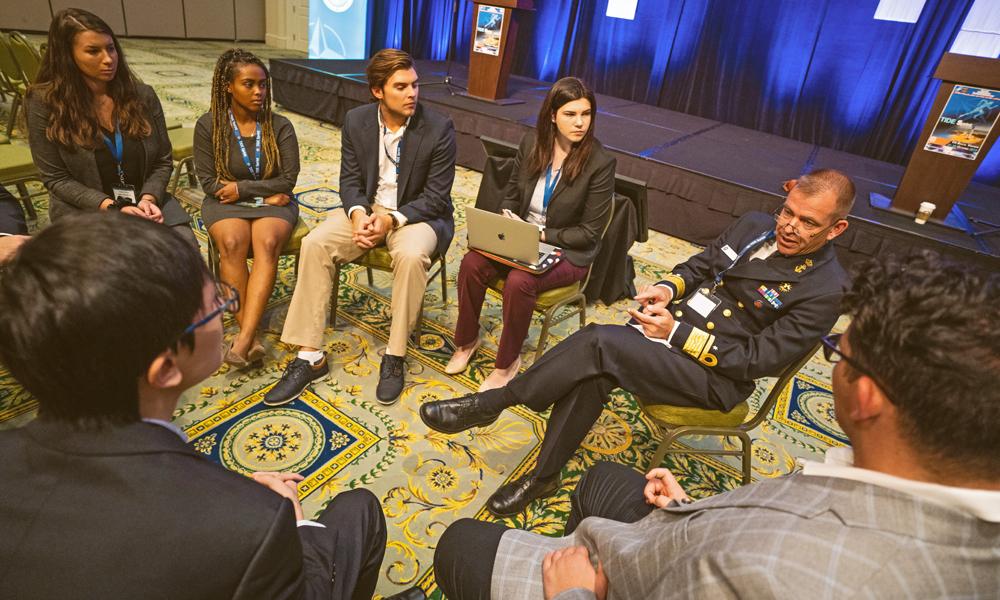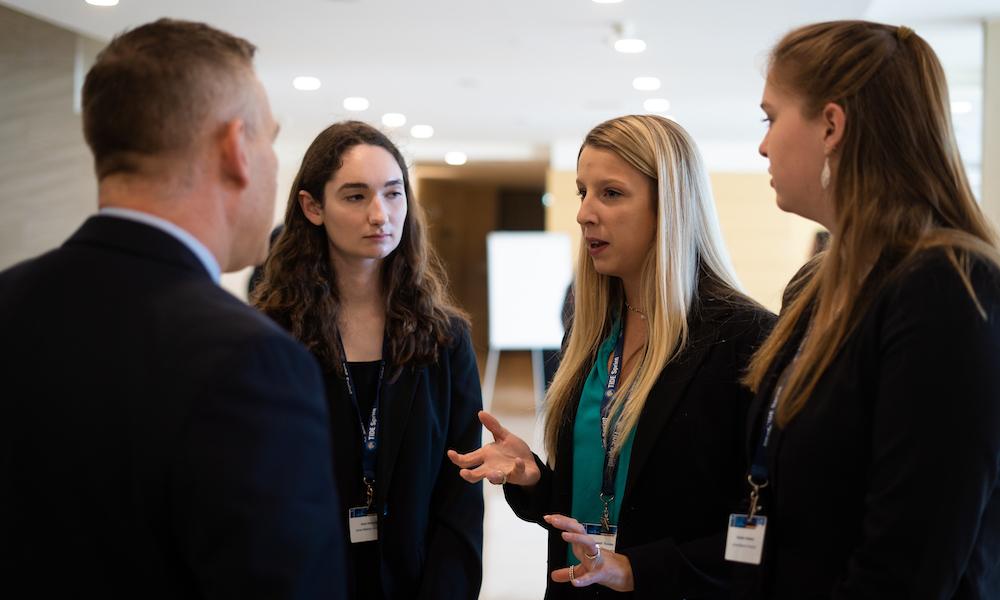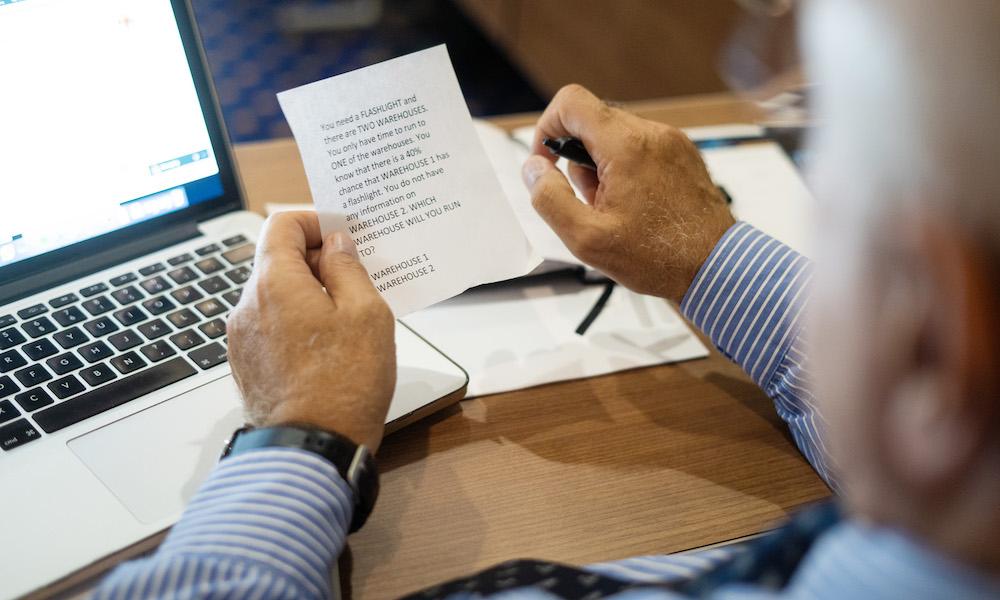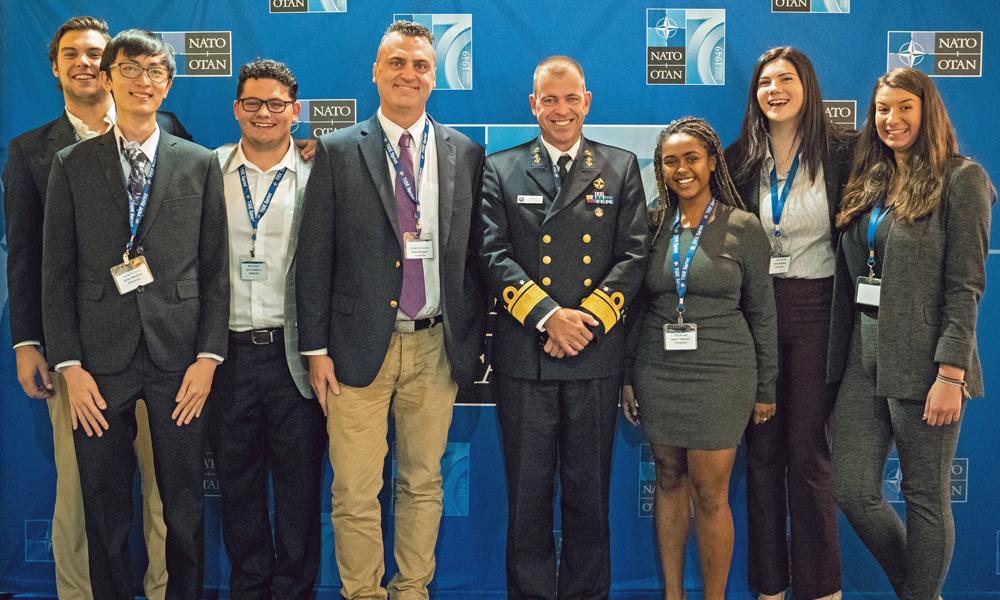‘Fast and Furious’
X-Labs students pivot to deliver decision-making tool to NATO
Nation and World
SUMMARY: When NATO needed help with deploying troops quickly and efficiently across Europe, the organization turned to JMU X-Labs, whose Hacking for Diplomacy classes delivered an app to improve decision-making among NATO officers.
By Amanda Christian
Imagine working on a class project for weeks—producing creative ideas, testing hypotheses, creating experimental designs and gathering feedback through a series of interviews—only to realize, the problem that really needed solving was something entirely different.
A group of JMU undergraduate students experienced this “pivot” on a grand scale while working with the international government entity NATO in Fall 2018. Originally tasked with a logistics problem of moving troops efficiently across Europe, the students soon found that the culture of decision-making within NATO was the real culprit.
The ambiguity in solving real-world problems is a part of the JMU X-Labs experience. Using a lean launchpad methodology, Hacking for Diplomacy students work together through a process of trial and error, continuously gaining feedback—and pivoting—throughout the semester. The methodology requires students to develop hypotheses and test their viability by conducting multiple interviews with stakeholders each week.
Three to four interdisciplinary professors introduce the methodology, assign groups and guide the students through their complex problems.
|
"They saw our vision and how they, too, are part of the NATO alliance in helping to solve the problem and provide solutions for a safer world." — Lt. Col. Vaughn Grizzle, NATO ACT project officer |
Political science professor Bernie Kaussler has been with H4Di since the start. “I’ve seen students who may not be in the top 4% but completely exceed in this particular course, and I was blown away by what they’ve produced,” Kaussler said. “It gives the student a different space to really shine in an area which they were not able to do in a traditional classroom.”
After sorting the students into groups of varying majors, backgrounds and leadership styles, each group is given a client with a problem that needs solving. The root of the problem—or the solution—isn’t obvious and requires the students to think and work through obstacles in new ways.
“I’ve learned to work toward a goal and have that goal change,” said Danielle Kratowicz, a junior accounting major who took the Fall 2018 class. “And then, more importantly, to have a destination for where you want to get, but have absolutely no road map for how you’re going to get there and what you’re going to do to reach that end game.”
In 2017, JMU became the first and only institution in the nation to offer H4Di exclusively to undergraduate students. By 2018, H4Di had added NATO’s Allied Command Transformation branch as a client.
The Fall 2018 team, First ACT, spent the first few weeks of the semester trying to get to the root of the problem. After realizing transportation logistics were only a small portion of the issue, they decided to focus on how decisions were being made in the first place.
 |
| First ACT team members Anne Uitvlucht, Elizabeth “Cole” Thomas and Danielle Kratowicz at the TIDE Sprint conference in Croatia in 2019 |
By the end of the semester, First ACT developed a minimum viable product, a decision-forcing exercise to accelerate troop deployment. The group went on to present their ideas to fellow H4Di classmates and NATO officers in Norfolk, Virginia, and later in Croatia.
Lt. Col. Vaughn Grizzle, the NATO ACT project officer who acted as the liaison between NATO and JMU, was impressed with what the students produced. “Their enthusiasm, desire and genuine interest to tackle the problem was clear from the beginning of the project,” Grizzle said. “They saw our vision and how they, too, are part of the NATO alliance in helping to solve the problem and provide solutions for a safer world. They really took ownership [of the project], so they definitely exceeded our expectations.”
With overwhelmingly positive feedback and another H4Di class scheduled in the fall, JMU X-Labs’ work with NATO was far from over.
The Fall 2019 group, renamed Fast and Furious Decisions, consisted of six students representing four majors—political science, international affairs, management and finance. The students were tasked with making the previously established minimum viable product a reality.
By the end of the semester, after a series of interviews, meetings and discussions, the team produced a computer application to help assess and test decision-making among NATO officers. The app includes a personality test that evaluates the kind of decision-maker the user is—specifically, where he or she falls on the risk spectrum. Then the officer is presented with a few scenarios embedded with common problems and is forced to make a decision.
 |
| As part of their training, NATO officers will now be required to put their decision-making to the test using an app developed by JMU students. |
Similar to the Fall 2018 team, the Fast and Furious Decisions team presented its work to H4Di classmates and in Norfolk to NATO officers. Three students were prepared to present at the annual TIDE Sprint conference in Stockholm, Sweden, at the end of March; however, the conference was canceled due to the COVID-19 pandemic. These presentations are a chance for more feedback to further refine the product, with the hopes of wide-scale implementation.
Experiences accumulated throughout the semester add invaluable skills and tangible work to the students’ portfolios, opening doors for them to succeed after graduation. Several H4Di alumni have landed internships, fellowships and jobs as a result of their client work.
Elizabeth “Cole” Thomas (’19), a student in the Fall 2018 class, was hired by Politico as a business development associate immediately after graduation. She says working with NATO gave her the confidence to step out into the real world. “I learned the importance of organization, confidence and the ability to sell a room. Perhaps most importantly, I learned the ability to be flexible and accept the fact that the first idea isn’t necessarily the best or end-all, be-all. These skills are things I fall back on often and am forever grateful for.”
H4Di makes students think differently, push past their comfort zones and build skills that will help carry them into their careers. “In the end, they don’t care about the grade; they think about creating something meaningful and of value to the client and to themselves,” Kaussler said.
 |
| Fast and Furious Decisions team members with professor Bernie Kaussler and Rear Admiral R.P. "René" Tas |
After a collective two semesters of work, JMU students did indeed create something meaningful for NATO ACT. Their goal is for the NATO school in Oberammergau, Germany, to adopt the decision-forcing tool. As part of their training, NATO officers would be required to put their decision-making to the test.
JMU X-Labs’ students were not the first students to attempt to solve the problem. After working with a graduate program from another university, Grizzle decided to go in a new direction. His tenacity and the high-quality work of JMU students led to an award for innovation from NATO.
|
"In the end, they don’t care about the grade; they think about creating something meaningful and of value to the client and to themselves." — Bernie Kaussler, political science professor |
“I could have given up on the idea and just let it die, since this wasn’t a mandatory project, but we all need to look at leveraging many avenues to solve a problem,” Grizzle said. “My recognition for the innovation award is directly related to the work that JMU students were delivering. As I mentioned to the students, I really was accepting the award on their behalf and they deserve all the credit.”
In the future, X-Labs hopes to continue working with NATO—whether it’s expanding what they’ve already produced or tackling a new challenge.
“Hacking for Diplomacy isn’t just any project- or discussion-oriented course,” said senior economics major Kevin Peng, an international student from Taiwan who was in the Fall 2019 class. “We are given the chance to not only make a difference in the well-being of the United States but contribute to the advancement of the world in general.”

